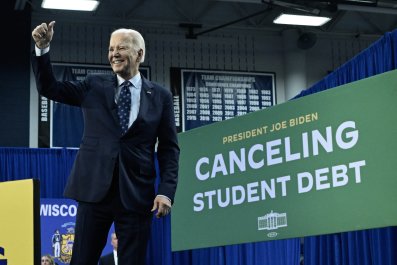An appreciation for language was instilled in William Cashore by his parents at an early age. His mother was an elementary school teacher and would quiz him on words in between homework assignments. His father was a laboratory technician who coached him on the roots of various English words.
"When they found out I was good at spelling, they and my high school teachers encouraged me to continue," he said.
Cashore, now 84, took that encouragement all the way to the Scripps National Spelling Bee, which he won in 1954 as a 14-year-old. Considered the oldest living winner of the competition, the Pennsylvania native spoke to Newsweek ahead of Thursday's spelling bee final, seven decades years after he took home the crown by correctly spelling the word "transept" (definition: the part of a building, like a church, that lies across the main body of the space).
Cashore said the Bee has changed a lot in the years since he stood on stage, with many more archaic words thrown at today's competitors to trip them up. The last two winning words — "psammophile" and "moorhen" — are terms he'd never have been able to spell, let alone use in a sentence. (For the record: a sand-loving organism and type of water bird, respectively.)
"They're not words that I use all the time. They're not words with which I'm familiar," he said of the modern Bee. "One of the games that the moderator plays with the spellers is to make the list as esoteric as possible."
"The vocabulary that we use now in the spelling bee is a part of the huge number of words which are either technical terms or they come from languages other than the ones we learned in school. They don't come from Latin or English or French. They come from all over the place," he said, noting that contestants who grew up speaking multiple languages tend to have an edge in the competition because they're "used to a different vocabulary."
Esteban Touma, a content producer and Spanish teacher with the language-learning software company Babbel, said learning other languages early can help give perspective to other potentially unexpected spelling "rules" while also opening up a learner to the possibility of other words and constructions.
Many of the words chosen for the Scripps Bee are often ones that have a deeper context.
"They correspond to a very specific use of the word," Touma said. "You have medical terms. You have terms that perhaps a little more specific...instead of saying timid you say pusillanimous."
As technology progresses, the importance of understanding the meaning behind certain words tends to get lost, according to Touma.
"With AI and autocorrect, we may be losing a little bit of our ability to have an understanding of the word," he said. "It's important for our communication to slow down and understand what are we saying, what is the context of the word we are saying, where does it come from."
Cashore had a more pointed term for the way we speak now: "sloppiness."
"When somebody says 'you see what I'm saying?' I don't see anything that you're saying," he said. "This was absolutely not permitted in the schools in which I attended."
Sloppy spelling habits can lead to "thinking sloppy," according to Cashore. While it's fine to loosen some standards to not always sound "like an English high teacher," he said he is not a fan of jargon.
"If you let slang, colloquialisms and poorly spelled words dominate in the conversation and what people write, it becomes very sloppy and undisciplined...I think lack of precision is a problem and lack of intelligibility is a problem."
Cashore would often use his spelling bee words in real life, as he went on to become a neonatologist and professor of pediatrics at Brown University: "For months and months, I practiced lists of words before I entered the bee in eighth grade," he said.
After 140 spellers were eliminated in the quarter- and semi-final rounds of the 2024 Scripps National Spelling Bee on Wednesday, the eight remaining finalists will compete in the final on Thursday night. In addition to bragging rights, the winner will receive a trophy and $50,000.
It's a far cry from the $500 and copy of Encyclopedia Britannica that Cashore was awarded 70 years ago.
Disclaimer: The copyright of this article belongs to the original author. Reposting this article is solely for the purpose of information dissemination and does not constitute any investment advice. If there is any infringement, please contact us immediately. We will make corrections or deletions as necessary. Thank you.




